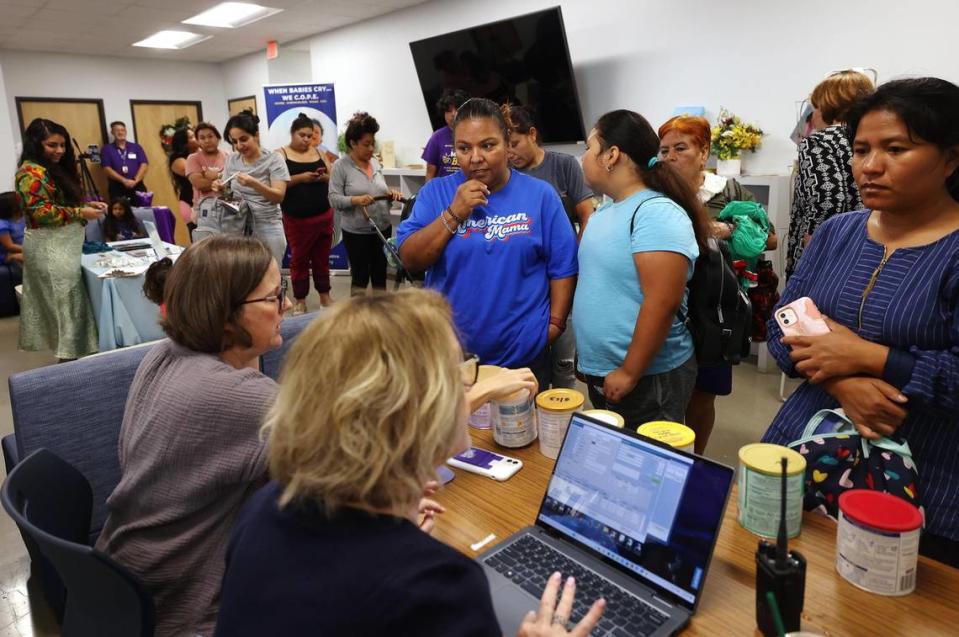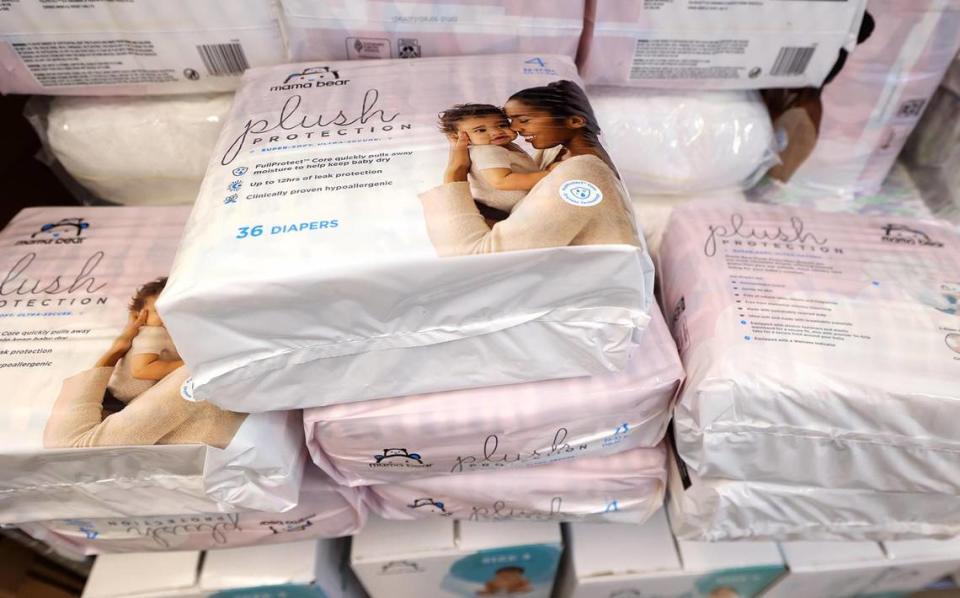Tarrant County and Texas parents will no longer pay taxes on diapers starting in September
Graciela Ramirez held her 1-year-old son, Mateo, on her hip as she stood in line among other parents who were waiting for a free pack of diapers, wipes and formula on Monday at the Community Crossroads Outreach Center.
As a mother of three with an hourly job that has fluctuating hours, Ramirez relies on the center for the supplies in the weeks when work is slower and her paycheck is slimmer. The center, located on Hemphill Street, is an extension of First Presbyterian Church of Fort Worth and helps provide parents like Ramirez with the necessities for young children.
The weekly diaper and formula drive is 9-11 a.m. on Mondays and offers diapers for children under 3 and formula for children under 1. Diaper packs range from 20-30 diapers each with sizes from newborn to size 7.
But starting on Sept. 1, products such as diapers, wipes and baby bottles could become less of a financial strain to parents when Senate Bill 379 becomes law, making these products tax free in Texas.
“It will definitely be a help,” Ramirez said, adding that she spends about $50 a week on diapers, wipes, lotion and formula. “I think one of the reasons people don’t want to have kids is because formula is expensive, diapers are expensive and food is expensive.”
One in two U.S. families are unable to afford a sufficient supply of diapers for their child, according to a 2023 study commissioned by the National Diaper Bank Network. Diapers cost about $125 a month per child with babies typically using 6-12 a day.
Locally, the need outpaces what can be provided by nonprofits alone, despite the expansion of their operations and budget for diapers, said Robin Greenhaw, president of the Junior League of Fort Worth.

The local Junior League, which is part of the National Diaper Bank Network, has collected more than 1 million diapers since its diaper bank launched in 2020, Greenhaw said. Those diapers are then given to organizations and outreach centers, such as Community Crossroads, which distribute them to families directly.
“For 2023-2024, we quadrupled our diaper budget because there is so much demand. We made the choice strategically and long-term to say that this is a program we want to further prioritize,” Greenhaw said.
Dori Al-Hammami, director of Community Crossroads, said 30% of the diapers they distribute come from the Junior League of Fort Worth and 70% come from members of First Presbyterian Church. There were 115 packages distributed to 86 families last Monday, she said, and the weekly amount each family is given lasts less than a week.
“They’re still having to purchase some themselves, so (the law) is still going to help our families for them to not have to pay the taxes on it,” she said.
Legislation and safety nets
Nonprofit organizations, parents and early childhood experts have applauded the law as a step forward in investing in the health and well being of families with young children.
Michelle Salazar Pérez, Velma E. Schmidt Endowed Chair for Early Childhood Education at the University of North Texas, called diapers “a basic medical necessity” that should also be subsidized through government programs such as the Special Supplemental Nutrition Program for Women, Infants and Children and the Supplemental Nutrition Assistance Program.
“(The law) is just going to provide so many forms of relief for families in ways that I wish would be extended even further than that,” she said. “I see it as a first step, too, in addressing the disparity of support that we give families who are in financial need.”
Although Republican Gov. Greg Abbott voiced support for eliminating tax on feminine hygiene products as early as August 2022, which is also included in the new law, a Tarrant County Republican was among 14 House members who voted against the legislation.
Rep. Tony Tinderholt, a Republican who represents part of Tarrant County, was the only local representative not in favor. Rep. Stephanie Klick, another Republican who also represents part of Tarrant County, was absent for the vote.
Tinderholt did not respond to requests for comment.
Health and developmental aspects of a clean diaper
The impacts of the law will go beyond parents’ pocketbooks with positive health effects, experts say. An unchanged diaper not only makes infants susceptible to painful rashes and urinary tract infections, but it also impedes them psychologically.
Wendy Middlemiss, professor of educational psychology at the University of North Texas, said a parent simply changing a diaper when it is soiled is an important example of how a healthy relationship between a parent and an infant is cultivated.

If a parent doesn’t have the means to make their child more comfortable by changing a diaper, the parent can become anxious or stressed, which “physiologically and neurologically impacts the infant,” she said.
In other words, the child’s stress response system is lacking the training it needs.
“That’s a very important cycle that develops in that first year that helps us understand that when we face stress, we can do something about it and get better,” Middlemiss said. “If that cycle isn’t nurtured and developed, then there’s not that sense that stress is something that can be dealt with.”

